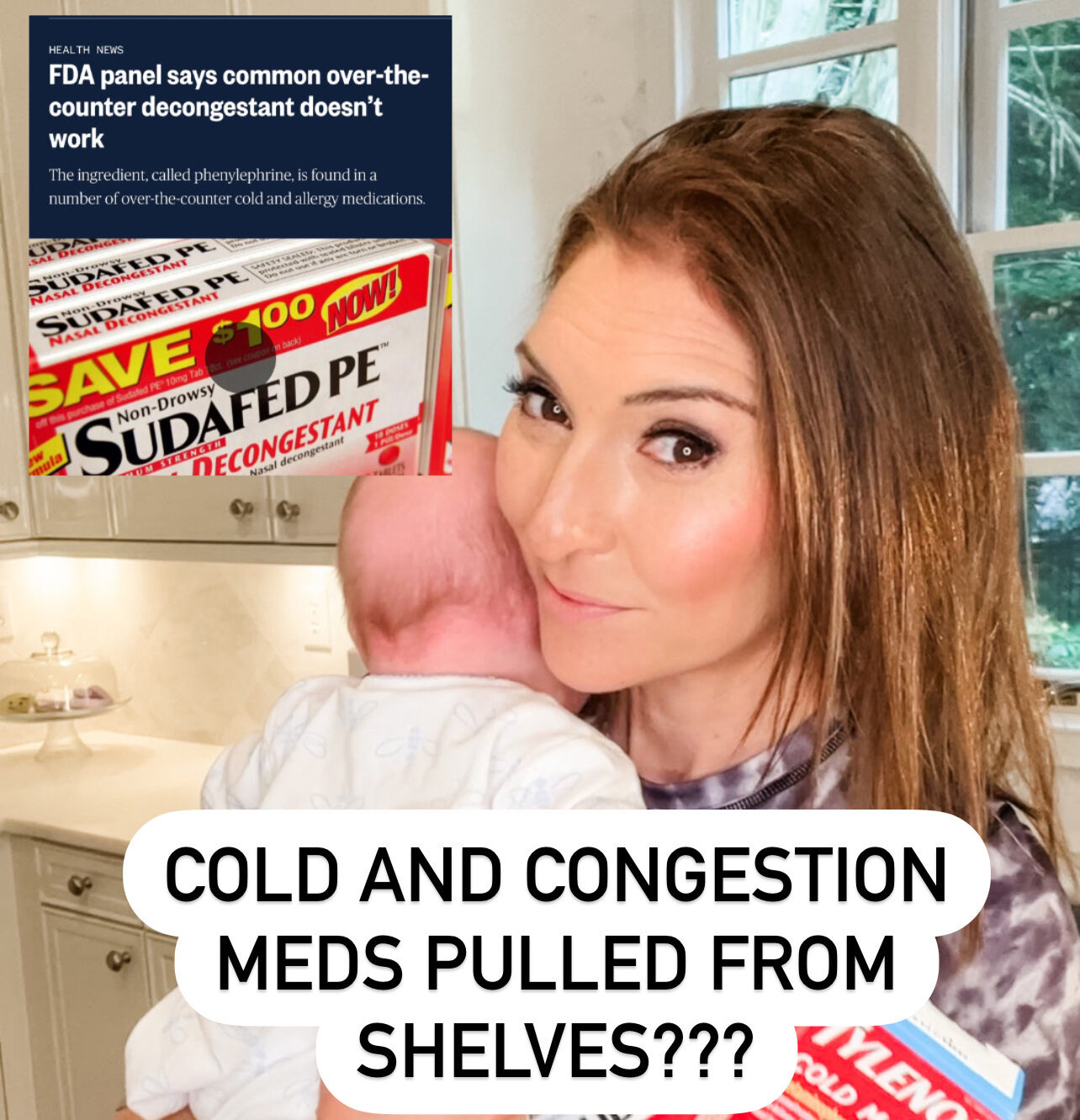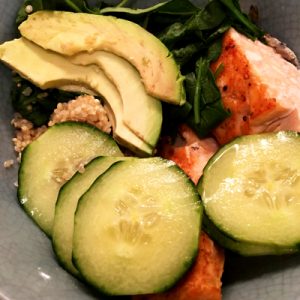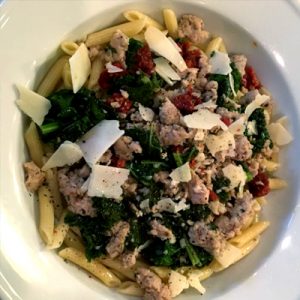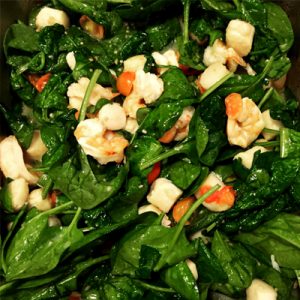An FDA Advisory Panel voted that phenylephrine is ineffective. What does this mean for your go-to congestion meds - just before cold and flu season?
If the latest headlines on phenylephrine left you confused, here’s a little context —
My Cold and Flu Quick Guide
Use this information below as your “Go-To Resource” for the upcoming cold and flu season. I’ve also included at the end a couple of “cheat-sheets” for the most complicated cases, such as children, pregnant women, and adults with high blood pressure—so print it out and take it with you on your next trip to the drug store!
Treatment for the cold and flu focuses specifically on symptomatic treatment, since the vast majority of these are caused by viruses that your body will eventually conquer. So, treatment focuses on minimizing how miserable you feel while you give your body the time to do this! Antibiotics are not effective for common cold symptoms, and are reserved for patients with bacterial conditions such as Streptococcal pharyngitis (“Strept Throat”), ear infections, pneumonia, and others.
- The symptoms usually last for up to 7-10 days in the average healthy patient. They last 3-4 days longer in smokers.
Ask Yourself: Are Your Symptoms In Your Head? Or Chest?
It’s always good to ask yourself this question, because it determines which class of medication you need. If it’s your head, decongestants, antihistamines, and steroids may be the most effective. If it’s your chest, then cough suppressants or expectorants may be the most helpful. Using more targeted treatment is always more effective (and with fewer side effects) than a scattered approach.
Pain/Fever
- Acetaminophen (Tylenol) 650mg every 4-6 hrs for pain or fever. Do not exceed 4grams in 24hrs
- Ibuprofen (Motrin or Advil) 600-800mg every 8-12 hrs for pain or fever
Nasal Pressure / Congestion: Topical Therapies
- Saline sprays – spray ample amount into nostrils, then blow out until you are able to clear congestion
- Neti pot—accomplishes same as saline sprays, more effective (people swear by it), but some people find it uncomfortable
- Afrin: This constricts constricts the vessels in the nostrils to decrease swelling and congestion. The downside? You cannot use for more than 72 hours, as using it longer can cause rebound nasal congestion – and a problem even worse than when you started.
- Nasal steroid sprays: [*Rx] These good for people who have allergic rhinitis, or runny nose and congestion due to allergies. Also, for someone with high blood pressure who cannot tolerate Pseudoephedrine, taking a nasal corticosteroid spray twice a day for 5-7 days can be almost as effective (but takes 1-2 days longer to work).
- Topical anti-histamines: Such as Azelastine nasal spray
Nasal Pressure/Congestion (Decongestants)
- Pseudoephedrine (Sudafed, in many other cold therapies) – temporarily dries/clears nasal passages. Pseudoephedrine is now sold only “behind-the-counter” and requiring ID, but it does not require a prescription. Now that the FDA is re-thinking their stance on Phenylephrine, it’s anyone’s guess if Pseudoephedrine comes back on the shelves.
- Phenylephrine: This had largely replaced pseudoephedrine in many medications, but the FDA may shortly pull it from medications, due to low efficacy. (Of note, I called out Phenylephrine for being less effective in an older version I wrote of this blog in 2011….). That said, if you have a good response to Phenylephrine, or you have high blood pressure or other options with Pseudoephedrine, then this is a fine option to continue to use.
- NOTE: Patients with Heart Disease or High Blood Pressure: these medications can increase blood pressure and heart rate, and may cause anxiety or insomnia. Be cautious if you are sensitive to these medications and do not take before bed.
- RULE OF THUMB: If you’re having to use these decongestants more than once or twice a month, on a chronic basis, then it’s time to stop just treating the symptoms, and instead trying to target what will decrease the production of mucus and post-nasal drip. Talk to your doctor about other options (below) such as nasal steroids, 2nd generation anti-histamines, or nasal antihistamine spray to use during the high allergy times.
Cough Suppressant (Anti-tussive)
Helpful if you have a cough that is so severe it interferes with speaking, breathing, and keeps you awake at night.
- Dextromethorphan (Delsym): affects the “cough trigger” in the brain
- Codeine: Codeine can be added to expectorants (see below), so you get both expectorant and cough suppressant benefits. This addition WILL make you sleepy, however, and you should avoid driving/operating machinery for at least 6-10 hours after taking it.
Expectorants
Thin the mucus in the air passages to facilitate coughing up the mucus and clearing airways.
- Guaifenesin (Robitussin Chest Congestion, Mucinex, Diabetic Tussin, Vicks Dayquil Mucus Control)
- Guaifenesin with Codeine (Robitussin with Codeine) [*Rx] – especially good if your coughing is keeping you awake at night
Vitamins / Herbal Remedies
- For more details on ways to *boost* your immunity and health around the cold and flu season, check out this post.
- Zinc: This therapy has been around since the 1970s, with conflicting evidence. A recent research paper found that if Zinc is taken within 24hrs of onset of cold symptoms, it significantly reduced the duration and severity of symptoms. Adverse effects of zinc include vomiting (so ALWAYS take these supplements with food!) as well as a bad taste. The FDA has put a warning against the intra-nasal forms as they can cause disruption of the sense of smell, so stick to the oral versions.
- Since Zinc can irritate the stomach, if you find that you are particularly sensitive, take it not only with food but also with an antacid such as Pepcid or Zantac
- Vitamin C: Once cold symptoms have started, Vitamin C has not been shown to be better than placebo for treating symptoms
- Echinacea: no data supports its efficacy in treating the cold
Other Treatments
- Humidifier: a 2004 study of 319 patients showed that inhaling warm vapor reduced symptoms by 31% and decreased nasal congestion
- Short course of steroids[*Rx] if there is a component of reactive airway disease (or asthma) to your disease
- Short course of albuterol inhaler [*Rx] (for the same reasons as the steroids)
For Children
**Caution for medications in children: in 2008, the FDA placed a warning to avoid using cough and cold medications for children under the age of 2 due to risk of death and serious harm. An FDA advisory panel also suggested placing the same restrictions for children up to the age of 5. These medications include decongestants, cough suppressants, and expectorants.
- Keep children well-hydrated. You can tell this by their urine output, if they have sunken eyes, and if their tongue or eyes appear more dry, instead of a moist sheen
- For coughing:
- Honey: ½ tsp of honey to children ages 2-5, 1 tsp for 6-11, and 2tsp for >12yrs. Don’t give to infants younger than 1 year
- Avoid anyone smoking near the child, avoid wood-burning fires
- If the child seems to have trouble breathing, has a barking cough, or has many, severe coughing spasms with vomiting after the cough, follow-up with your child’s doctor to have them evaluated for a more serious condition
- For scratchy throat:
- Soft foods, such as pudding, popsicles, chicken soup, jello, and ice cream
- Congestion:
- For infants, saline nasal drops and nasal suctioning can be extremely helpful and is the most beneficial intervention. You can also do this in order children, or just use saline nasal sprays and then have them blow their nose
- Cool mist Humidifier in the room. Do not use hot water in vaporizer, and make sure to empty the water after every use to avoid growing mold, which would only worsen their breathing.
- Remember, babies are often nose breathers. Unlike adults, who recognize that they should breathe through their mouth when their nose if clogged, babies don’t understand this, so can have more difficulties from a stuffed nose, making it even more important to try to suction out the mucus from their nose when possible.
For Pregnant Women
- Pregnancy can add a challenging wrinkle to many therapies that we typically use to treat colds and the flu. Patients and physicians must weigh the risks and benefits, and in many of the therapies, conclusive evidence is simply lacking in human models.
- Since most of the above therapies do not shorten the duration of the illness, but simply help symptoms, it’s best for pregnant women to simply stick to those therapies that have the greatest safety data.
- Heated humidified air for congestion
- Acetaminophen (Tylenol) for sore throat, headaches, and fever
- Other therapies, such as Ipratroprium bromide nasal spray have reassuring data in animals, but not specifically in humans, and should only be taken after a discussion with your physician. Zinc and Vitamin C are not advised to be taken in pregnancy as they have been shown to have detrimental effects on the fetus at high doses.
All my best,
- Dr. Darria







